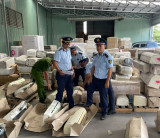Local leather-footwear industry: Restructuring production processes in new period
In the first seven months of 2024, Binh Duong province's leather and footwear industry obtained over US$1.03 billion in export turnover, an increase of 9.4% compared to the same period in 2023. Along with the wood and textile industries, it was among the province’s three sectors achieving over US$ 1 billion in export turnover in the first seven months of the year. Currently, the industry has abundant orders, providing it with favorable conditions for the remaining months of the year.
Securing export orders for 2024
These days, the factories of Thai Binh Investment Joint Stock Company (TBS Group) are focused on fulfilling orders to ensure timely delivery to their partners. The company aims at increasing its export value by over 20% this year compared to 2023. Nguyen Anh Tuan, Deputy General Director of TBS Group shared that the company is not only focusing on production, but also expanding its workshops, attracting additional 10,000 workers to get new orders and meet the demand for increased export production from the first quarter of 2025. To date, the company has secured sufficient export orders for the entire year of 2024.
.jpg)
Shoes manufacturing activities for export at TBS Group
Nguyen Quang Vu, Chairman of Biình Duong Leather and Footwear Association stated that the local leather and footwear companies have already secured sufficient export orders for the whole year of 2024. Additionally, due to stable domestic production conditions, orders for the last months of the year have shifted from some Asian countries to Vietnam, opening up prospects for the industry in the coming time. The largest export market for this sector is the European Union (accounting for 34.1% of total), followed by the United States (accounting for 27.7%) and Japan (accounting for 7.4%).
Notably, the export volume of leather and footwear products from province-based enterprises in the first seven months of 2024 reached 5 million pairs per month, an increase of nearly 1.1 million pairs per month compared to the monthly average level in 2023.
Bold digital transformation
To date, province-based leather and footwear companies have not only grown in scale and structure, but also made significant advancements in production technology. Most companies have invested in modern production equipment from the United States, the European Union, Japan and other countries. Companies such as TBS Group, Dong Hung Industrial Joint Stock Company and Chi Hung Company are leading in applying new technologies in Vietnam and have been pioneers in achieving success in digital transformation.
Along with investment in modernizing production equipment, province-based leather and footwear companies are also focusing on producing materials from domestic resources, allowing them to take control of the supply of raw materials, thereby reducing the import rate of these materials. For the European Union market, where most of the products are sports shoes, the import rate of raw materials has decreased from 65% in 2010 to just 20% today. Additionally, these companies have excelled at training skilled laborers, including management teams, designers and marketing staff at the demands of global integration.
With the current scale, the province’s leather and footwear industry can produce over 100 million export products annually. In addition to advantages brought by bilateral and multilateral trade agreements, the ongoing restructuring of many large global supply chains presents an opportunity for the industry to grow vigorously. However, to remain competitive, the industry must further invest in the production of raw materials, focus on tapping domestic market and diversify export product categories.
In addition to the above advantages, Binh Duong is also facing the opportunity to receive the 4th wave of foreign direct investment, focusing on high-tech fields of electronics, semiconductors, artificial intelligence and renewable energy. These are "golden opportunities" that Vietnamese enterprises in general and province-based leather and footwear enterprises in particular need to take full advantage of to restructure and develop production and export in a sustainable direction.
Nevertheless, the leather and footwear industry still faces considerable challenges in major markets, namely the European Union and the United States as these markets are implementing new import regulations, including the European Union's Carbon Border Adjustment Mechanism (CBAM)…This requires the industry to constantly innovate to meet the stringent demands of these markets.
According to experts, CBAM might not be uniformly applied at this time, but it is highly likely to be fully enforced by 2030. This means that Vietnam's leather and footwear companies, particularly those in Binh Duong, have six years to restructure their entire supply chain process, from raw materials to improvement of operational processes, application of new technologies such as digital technology, artificial intelligence, and Net Zero regulations… to perfection of export products. This is a short timeframe, requiring companies to act swiftly.
Reported by Tuan Anh-Translated by Kim Tin
 Developing Bac Tan Uyen district into a town in the period 2030-2040
Developing Bac Tan Uyen district into a town in the period 2030-2040
 Accompanying investors for sustainable development
Accompanying investors for sustainable development
 Tan Uyen: Flexible adaptation, stable growth
Tan Uyen: Flexible adaptation, stable growth
 Tax revenue management boosted and modernized
Tax revenue management boosted and modernized
 To build synchronous infrastructure, facilitate new era development
To build synchronous infrastructure, facilitate new era development
 Bau Bang aims to become a center of innovation and industry
Bau Bang aims to become a center of innovation and industry
 Processing and manufacturing industry makes high efforts, gains good growth
Processing and manufacturing industry makes high efforts, gains good growth
 Enterprises assisted to enhance product quality and elevate competitiveness
Enterprises assisted to enhance product quality and elevate competitiveness
 Processing and manufacturing industry accounts for over 91% of foreign investment capital
Processing and manufacturing industry accounts for over 91% of foreign investment capital
 Strengthening removal of obstacles to promote socio-economic development
Strengthening removal of obstacles to promote socio-economic development




